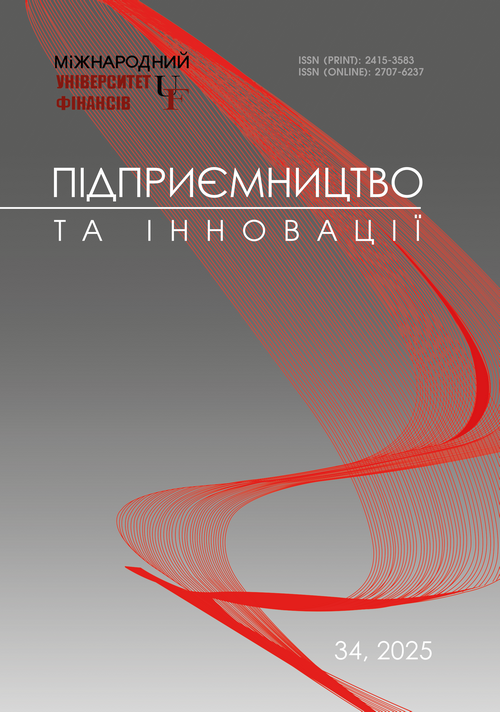MECHANISM FOR MANAGING THE COMPETITIVE ADVANTAGES OF AN ENTERPRISE AS THE MAIN FACTOR IN REALISING ITS POTENTIAL IN THE CONTEXT OF SUSTAINABLE DEVELOPMENT
Abstract
The article discusses the tools for managing the potential of enterprises in the agrarian sector of the economy in the conditions of a circular economy. The main tool for increasing the effectiveness of realizing the potential of enterprises is the formation of a mechanism for managing competitive advantages as a set of interconnected levers and measures directed by the subjects of the enterprise's management to achieve its goals on the basis of sustainable development. The formation of the mechanism for managing the competitive advantages of the enterprise involves the development of tools for influencing structural and functional potentials, the interaction of which ensures the desired state of the enterprise at the required time based on the maximum realization and development of its integral potential. The main feature of applying the system of personnel motivation methods at enterprises of the agrarian sector of the economy in the conditions of the circular economy is the formation of its properties to create opportunities for all employees, without exception, to show creative leadership qualities and quickly adapt to the changing conditions of the internal and external environment. At the same time, moral and psychological methods of motivation should be aimed at forming the internal motivation of employees through their self-realization, satisfaction with the results of their work, the formation of a healthy psychological climate and a high level of development of relations at the enterprise. One of the key tools for the formation of a mechanism for managing the competitive advantages of enterprises in the agrarian sector of the economy is the development of means of optimizing the structure of the enterprise's potential through the wide application of mathematical modeling methods. In general, the optimization of the overall potential of the enterprise involves the formation of the best relations between its components (structural and functional potentials) in order to maximize its realization and ensure competitive advantages in the current and future periods.
References
Ареф’єва О.В. Стратегічні орієнтири інтелектуально-інноваційного процесу управління конкурентним розвитком. Адаптивне управління підприємствами в умовах неотехнологічного відтворення: монографія / За редакцією Ареф’євої О.В. Київ : ФОП Маслаков, 2020. С. 7–14.
Ареф’єва О.В., Годун В.І. Стратегізація підвищення конкурентоспроможності підприємства на ринку транспортних послуг. Економіка та суспільство. 2023. Вип. 23. DOI: https://doi.org/10.32782/2524-0072/2023-55-113
Капустянський П.З. Мотивація праці персоналу сучасних організацій (організаційно-управлінський аспект): монографія. Київ : ІПК ДСЗУ, 2017. 155 с.
Кириченко Л. Механізм управління конкурентоспроможністю підприємств. Вісник КНТЕУ. 2009. № 1. С. 62–66.
Онопрієнко Д.О. Практичний підхід оцінювання потреби в розвитку потенціалу підприємства. Управління змінами та інновації. 2024. № 12. С. 46–52.
Павлова В.А., Губарєв Р.В. Система управління конкурентоспроможністю. Європейський вектор економічного розвитку. 2014. № 2 (17). С. 168–176.
Савчук О. Критерії конкурентоспроможності та їх оцінка. ІІ Міжнародна науково-практична інтернет-конференція «Облік, оподаткування і контроль: теорія та методологія». 20 листопада 2017 року, м. Тернопіль.
Троян М.Ю., Савченко О. Роль дослідження мотивації споживачів. URL: https://essuir.sumdu.edu.ua/handle/123456789/12272.%205
Уніят А.В. Критерії та оцінка конкурентоспроможності країн на міжнародному рівні. Галицький економічний вісник. 2009. № 2. С. 7–13.
Arefieva O. V. (2020) Strategic orientations of the intellectual and innovative process of managing competitive development. Adaptive management of enterprises in conditions of neo-technological reproduction: monograph / edited by O.V. Aref'eva. Kyiv: FOP Maslakov, pp. 7–14.
Arefieva O. V., Godun V. I. (2023) Strategizing to increase the competitiveness of the enterprise in the market of transport services. Economy and society, issue 23. DOI: https://doi.org/10.32782/2524-0072/2023-55-113.
Kapustyansky P. Z. (2017) Work motivation of personnel of modern organizations (organizational and managerial aspect): monograph. Kyiv: IPK DSZU, 155 p.
Kyrychenko L. (2009) The mechanism of managing the competitiveness of enterprises. Journal of KNTEU, no. 1, pp. 62–66.
Onoprienko D. O. (2024) A practical approach to assessing the need for enterprise potential development. Management of changes and innovations, no. 12, pp. 46–52.
Pavlova V. A., Gubarev R. V. (2014) Competitiveness management system. European vector of economic development, no. 2 (17), pp. 168–176.
Savchuk O. (November 20, 2017) Competitiveness criteria and their assessment. II International Scientific and Practical Internet Conference "Accounting, Taxation and Control: Theory and Methodology". Ternopil.
Troyan M. Yu., Savchenko O. The role of consumer motivation research. URL: https://essuir.sumdu.edu.ua/handle/123456789/12272.%205
Uniyat A. V. (2009). Criteria and evaluation of the competitiveness of countries at the international level. Galician economic journal. no. 2. pp. 7–13.



